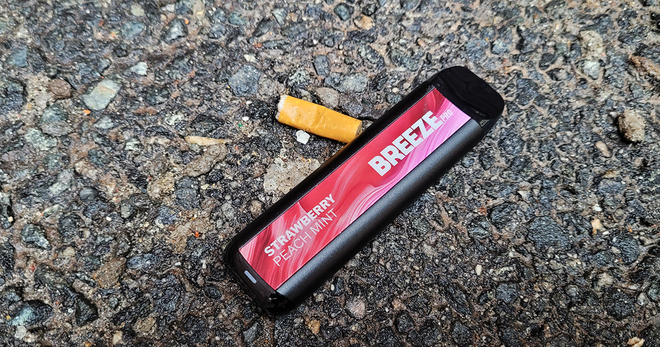Not-so-disposable e-cigarettes: Young people grapple with e-cigarette waste amid lack of safe disposal options
Millions of single-use “disposable” e-cigarettes are piling up in landfills across the country. Over half of young people surveyed discarded their disposable devices in the trash, with less than a quarter reporting recycling them, according to new research from Truth Initiative published in Addiction.
Single-use e-cigarettes, the most commonly used e-cigarette device type in 2023, contain lithium batteries and e-liquids encased in plastic that can leach chemicals into the environment or even explode, causing fires at trash and recycling plants. According to the Bureau of Investigative Journalism, at least five disposable e-cigarettes are being thrown away every second in the United States, amounting to an alarming 150 million devices per year.
A lack of clear disposal guidance from regulatory agencies and e-cigarette manufacturers has left many users unsure of what to do with used devices. Most throw them away, while others keep them. Federal, state, and/or local governments need to set clear standards for environmentally responsible e-cigarette waste disposal and should hold the industry accountable for reducing the environmental risks associated with these products. The Truth Initiative research also recommends removing single-use e-cigarettes from the market to reduce waste at the production level.
Most respondents discard disposable e-cigarettes in regular trash, raising environmental and safety concerns
For this study, researchers collected data from a national sample of 1,313 U.S. residents ages 15-24 who reported using disposable e-cigarettes in the past 30 days. Over half of the surveyed users (52.9%) tossed their spent devices into regular trash, while more than one-fifth (21.4%) reported keeping or collecting their empty vapes. Only 13% reported any form of recycling, split between regular recycling and electronic waste recycling. On average, each user discarded about three devices monthly. Disposable e-cigarettes have higher nicotine concentrations than previous generations, raising concerns about nicotine addiction among young people and the ongoing hazardous waste from these highly addictive products.
Disposable e-cigarettes saw a huge rise in popularity after they were exempted from federal restrictions in 2020 that only removed flavored pod-based e-cigarettes from the market. Following these restrictions, use of disposable e-cigarettes increased over 1,000% between 2019 and 2020 among high school e-cigarette users. In 2022, disposable e-cigarette use became more popular than ever, with disposables making up nearly 50% of the U.S. e-cigarette market share
The study also found that frequent e-cigarette users are more likely to collect empty devices, possibly due to uncertainty about proper disposal methods. Previous survey data from 2019 found that young people clearly understand that e-cigarette waste is bad for the environment, but with limited safe disposal resources, it’s difficult for users to make an informed decision.
Regulation surrounding e-cigarette waste is long overdue
Recycling programs and safe disposal guidelines for single use e-cigarettes are virtually non-existent. The Environmental Protection Agency recommends users bring empty devices to a hazardous waste collection site where the battery and e-liquid can be removed — but many types of single-use e-cigarettes are not designed to be taken apart, and batteries can explode and cause fires if punctured.
To fully address the issue of e-cigarette waste, the authors recommend removing single-use e-cigarettes from the market. In the meantime, federal, state, and/or local governments must hold e-cigarette manufacturers accountable for addressing a problem that they created. Products should contain a removable battery that can be easily recycled, and manufacturers must provide guidelines for safe disposal of their products.
More in harmful effects of tobacco
Want support quitting? Join EX Program
By clicking JOIN, you agree to the Terms, Text Message Terms and Privacy Policy.
Msg&Data rates may apply; msgs are automated.


